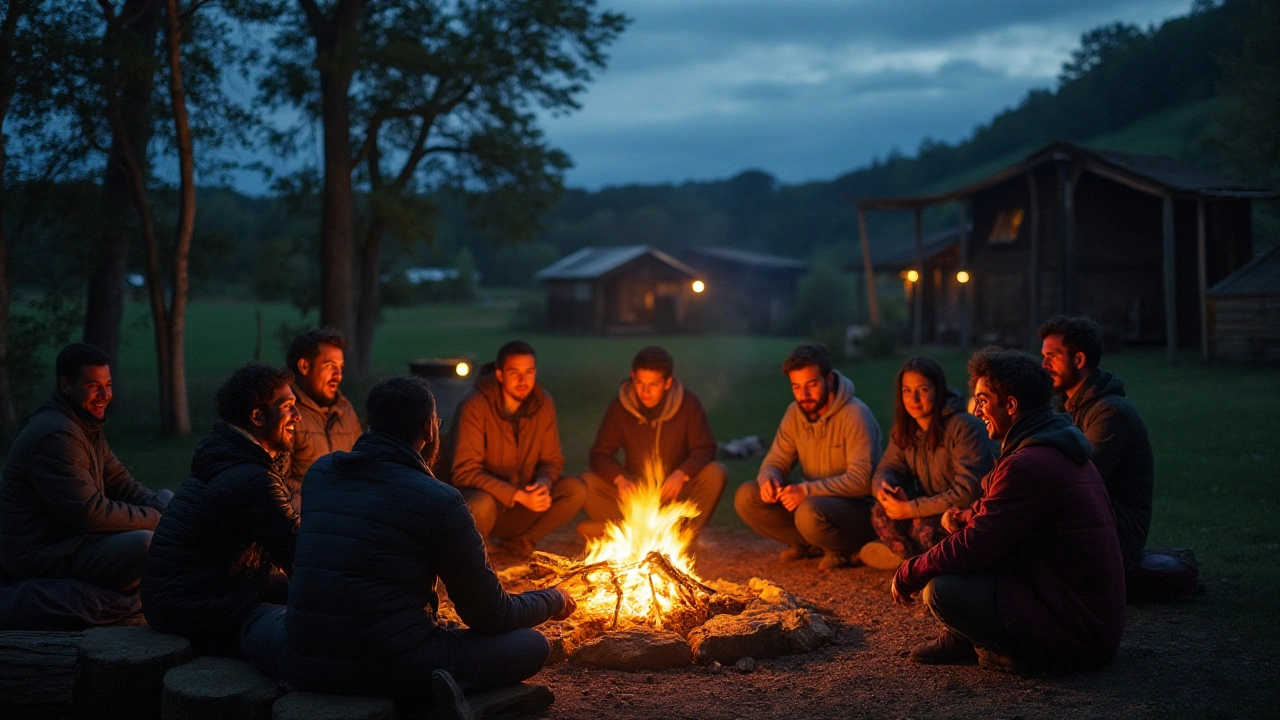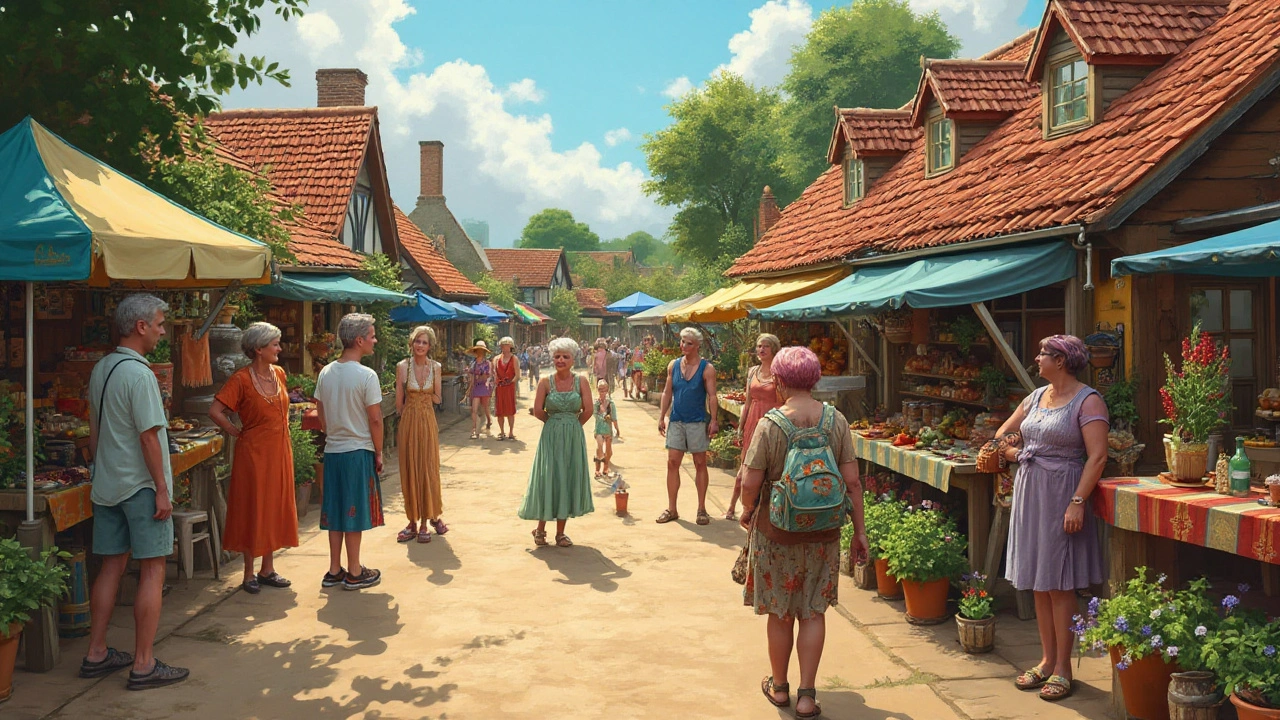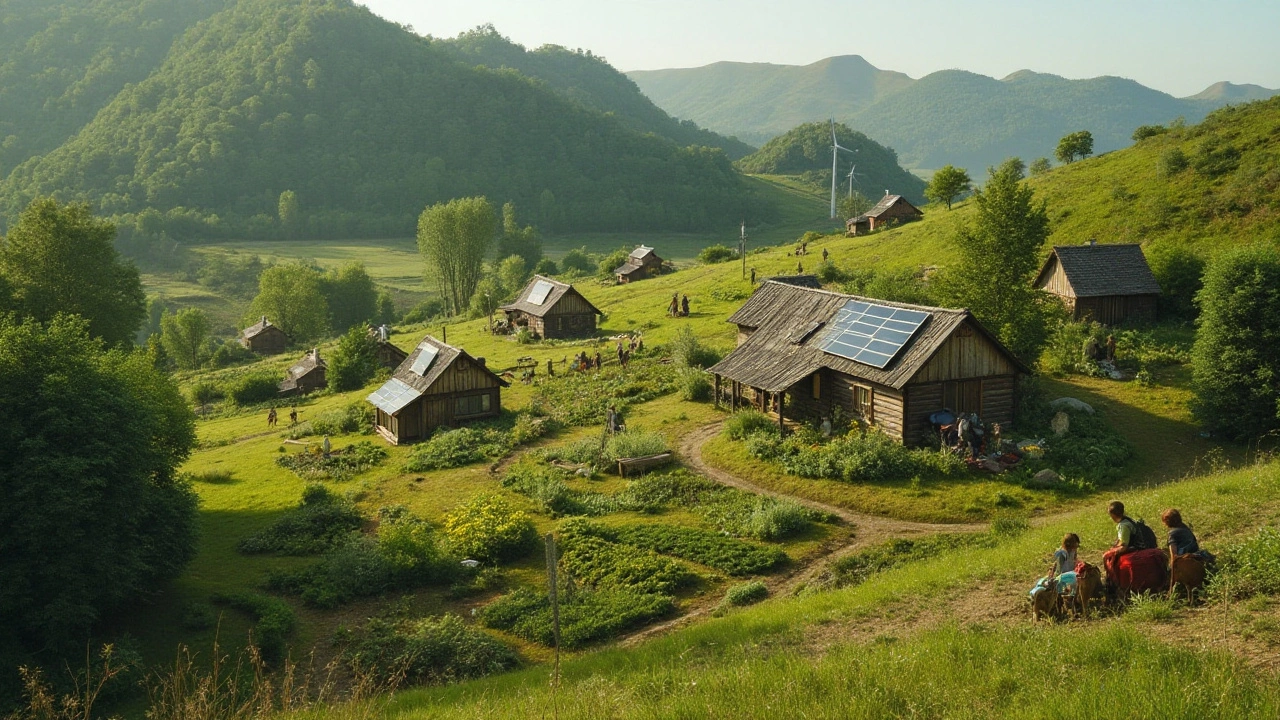Have you ever wondered about life beyond the reach of the conventional electrical grid? The UK hosts a range of off-grid communities that not only survive but thrive on the edges of modern society. These unique enclaves have captured the imagination of many who seek a return to simpler, more sustainable ways of living.
Off-grid living isn't just about escaping the hustle; it's a conscious decision to engage with the world differently. These communities are often diverse, some rooted deeply in eco-friendly practices, while others simply embrace a quieter way of life amid nature's embrace.
For the wild camper who cherishes the lure of the outdoors and imbibes in the beauty of self-reliance, understanding these communities can be both inspiring and enlightening. This exploration provides a window into their world, sharing insights that could enrich your camping experiences and inform more sustainable living choices.
- Understanding Off-Grid Living
- Why People Choose Off-Grid Life
- Notable Off-Grid Communities in the UK
- Wild Camping and Off-Grid Philosophy
- Tips for Visiting Off-Grid Communities
- Embracing Sustainable Practices
Understanding Off-Grid Living
In the heart of a bustling, hyper-connected world, the concept of living off-grid might seem like a step back in time. Yet, this way of life has been quietly flourishing, offering a powerful counter-narrative to mainstream living. At its core, off-grid living is about self-sufficiency—running independently without relying on public utilities like electricity, water, and sewage systems. Those who engage in this lifestyle often generate their energy through renewable sources, capture rainwater for use, and create sustainable systems to manage waste. This not only reduces their carbon footprint but also fosters a close-knit relationship with nature. In the UK, numerous off-grid communities have emerged, each with its distinct characteristics but unified by the common goal of sustainable living.
Many people are drawn to off-grid living for different reasons, ranging from environmental concerns to a desire for personal freedom. For some, it's about escaping the constant digital noise and living a life that aligns with their values. "Living off-grid is more than just falling asleep to the sound of the crickets and waking up with the first light of dawn," says Tom Hodgkinson, author and advocate of simple living.
"It's about reclaiming control over your essential needs and finding joy in the simplicity of everyday tasks."The financial benefits are also significant—after the initial setup costs, maintaining an off-grid home can be more economical, given the reduced reliance on expensive public utilities.
The technological advances over the past few decades have made off-grid living more accessible. Solar panels, wind turbines, and micro-hydro systems have become more efficient and affordable, allowing households to generate their power effectively. One interesting statistic that highlights this shift is that the cost of solar technology has dropped by over 80% in the last decade. This shift has empowered more individuals and communities to embrace off-grid technologies and take a step toward sustainable living. A 2021 report from the Solar Trade Association indicated that the UK saw a significant increase in solar power usage, showing the nation’s growing acceptance of renewable energy sources.
Living without a connection to municipal water systems involves innovative solutions. Many off-grid communities collect and purify rainwater, storing it for household use. In addition, composting toilets are often utilized to manage waste without the need for sewage infrastructure. This not only lowers water usage but also enriches the living environment by turning waste into valuable compost. What stands out about these communities is how their residents learn from each other, sharing knowledge and experiences through workshops and communal projects. This bond creates an engaged community where individuals support one another's journey toward independence from conventional systems.
Why People Choose Off-Grid Life
In this fast-paced world, many individuals find themselves yearning for a return to simplicity and self-reliance, which leads them to explore the concept of off-grid living. The allure of this lifestyle manifests itself in a myriad of forms, primarily driven by the desire to minimize dependence on external systems and foster a closer connection with the environment. People are increasingly aware of the environmental impact of the modern high-consumption lifestyle, and turning their backs on grid dependency offers a sense of empowerment. Living off the grid involves generating your own energy, sourcing food locally, and minimizing waste. It is a radical departure from traditional life, breathing the air of freedom and sustainability.
The decision to embark on this path is not taken lightly; it represents a conscious commitment to embracing the unpredictable dance with nature. Becoming part of an off-grid community sets a compelling stage for a life where individuals have complete autonomy over their consumption patterns, often powered by renewable energy sources like solar panels or wind turbines. These communities provide a canvas where one can implement self-sufficient practices, such as permaculture, that further emphasize environmental stewardship. It’s about reclaiming time, defying consumerism, and perhaps most importantly, finding a distinct sense of satisfaction in self-sufficiency.
This lifestyle is lauded by many, but understanding why people gravitate towards it requires delving into the ethos of environmentalism and self-sustenance it embodies. According to a study published by The Good Life Foundation, over 50% of people opting for off-grid living cited eco-consciousness as a primary motivator. They seek to minimize the carbon footprint and actively participate in conservation efforts—a testament to the growing awareness and responsibility people now feel towards Mother Earth. Their journey often results in a newfound appreciation for the resources we might otherwise take for granted.
There’s an unequaled thrill in generating and managing your resources and adapting to the rhythms of nature, which is inherently rewarding and humbling at once. Off-grid communities often emerge as beacons for this autonomy, where like-minded individuals share skills, resources, and support networks. In these spaces, the typical barriers of urban life fade away and are replaced by collaboration and coexistence with the elements. As author Robert Greenfield states, "Living off the grid is an act of courage—a momentous leap towards embracing growth that is meaningful and life-affirming." Such reflections underscore the profound shift in priorities experienced by those who opt for an alternative way of life.
Entrepreneurial spirits find the off-grid lifestyle appealing because it allows them to innovate and experiment in how they live, reducing costs, and often boosting quality of life. They explore creative solutions to common challenges and may even discover unexpected talents or passions along the way. This unrivaled opportunity for personal growth acts as a magnet, drawing individuals and families towards a life that's rich in enhanced well-being, steadfast in minimizing harm, and poised to forge a path complementing nature.

Notable Off-Grid Communities in the UK
In the serene pockets of the UK countryside, off-grid communities carve out an existence that defies traditional living. These self-sufficient enclaves are becoming focal points for those committed to sustainable living while capturing the curiosity of the adventurous wild camper. One of the most prominent examples is the Lammas Ecovillage in Wales. Established in 2009, this community stands as a beacon for those who wish to step back from the trappings of modern urban life. Known for their innovative eco-building methods and permaculture farming, members of Lammas have cultivated not just crops but a unique way of life.
The Hebridean island of Eigg offers another fascinating glimpse into off-grid living. The island is community-owned, with around 90 residents sharing the land. They have been remarkably successful in utilizing renewable energy sources, achieving almost 100% energy self-sufficiency through a combination of wind, solar, and hydroelectric power. Their commitment to sustainable energy is not only impressive but provides a template for what is achievable in resource management.
"Living off-grid on Eigg means working with nature rather than against it," one resident noted, sharing their insight into the community’s harmonious relationship with their environment.
Another significant player is Tinkers Bubble in Somerset. This tight-knit group lives and operates without fossil fuels, relying instead on horse-drawn equipment and wood-fuelled steam engines. Their off-grid journey is reminiscent of a bygone era, yet it is underpinned by a contemporary understanding of ecological balance and land stewardship. Despite the old-world charm, these residents have drawn wide attention from those eager to learn about traditional methods combined with modern environmental philosophies.
Wild camping enthusiasts are often inspired by these communities as they align with similar values of minimal impact and reverence for the natural world. The ability to witness firsthand how these communities function can be eye-opening, revealing the intricate operations behind living off the grid. For prospective visitors, understanding these places is paramount before embarking on a journey to visit, as respect and adherence to community guidelines ensure a harmonious encounter.
Below is a brief summary of some notable UK off-grid communities and their key characteristics:
| Community | Location | Features |
|---|---|---|
| Lammas Ecovillage | Wales | Eco-building, permaculture, cooperative living |
| Isle of Eigg | Scotland | Community-owned, renewable energy dependant |
| Tinkers Bubble | Somerset | Fossil fuel-free, traditional methods, land stewardship |
These notable communities are more than just places to live; they are experiments in redefining what it means to be connected — not just to each other, but to the land itself. For those intrigued by this lifestyle, exploring these areas can provide not just inspiration, but a profound understanding of sustainable living on the UK's shores.
Wild Camping and Off-Grid Philosophy
Wild camping embodies a similar spirit to that of the off-grid communities found throughout the UK. Both stem from the desire to break away from the traditional norms of society and connect more deeply with nature. When you set out to pitch your tent in a secluded spot, whispering winds through trees and skies filled with stars replace city lights. The core philosophy is to return to basics, where each action is purposeful, and living is more about experience and less about consumption.
Just as off-grid communities strive to minimize their reliance on modern utilities and amenities, wild camping enthusiasts are drawn to the raw, unfiltered beauty of the wilderness. They take pleasure in simple joys—boiling water over a crackling fire, waking to the song of early birds, and feeling the earth underfoot. It's a direct contrast to the usual luxury facilities of big campgrounds, favouring solitude and tranquil landscapes over crowded, serviced plots.
Across the UK, the tradition of wild camping has intertwined with the off-grid way of life, fed by a common ethos of sustainability and respect for nature. Off-grid living doesn’t just ask for going without; it demands creativity and ingenuity, much like finding ways to blend into the landscape without leaving a trace. Enthusiasts often speak of the spiritual tranquility they find, or as a wild camper might say, “
There's a special kind of freedom in knowing that everything you need is either in your pack or is provided generously by the earth around you,"a sentiment echoed by many.
Adopting the off-grid mindset isn't reserved only for those living it daily; many wild campers have influenced their routines. Whether it's choosing to cook on a portable stove rather than relying on single-use plastics or taking the time to learn about local flora and fauna, minute adjustments make a considerable difference. Some even venture into communal camping experiences, learning from the very off-grid communities they admire.
There is a growing recognition among wild campers and off-grid participants alike: the importance of teaching responsible practices to newcomers. Advocates urge campers to follow ‘Leave No Trace’ principles deliberately. This includes packing out every piece of litter, burying waste appropriately, and respecting wildlife. These practices ensure that the delicate balance and beauty of both wild places and off-grid sanctuaries remain undisturbed for generations.
UK wild camping adventures align snugly with the essentials of off-grid living, offering an avenue to reconnect profoundly with our natural world. Embracing this philosophy inspires us not only to camp with care but to live with renewed gratitude and responsibility towards the environment. As noted in statistics, environmentally conscious camping practices have risen by 25% over the past decade, showing that the wild camping community continues to advocate for sustainable interactions with the world around us.

Tips for Visiting Off-Grid Communities
Visiting off-grid communities in the UK can be an enlightening experience that provides a glimpse into sustainable living and the beauty of simplicity. However, it's important to approach these visits with respect and understanding. One key aspect is to do your research before you set off. Not all communities welcome visitors, and the ones that do may have specific guidelines. Understanding their way of life and being aware of any community regulations is crucial.
Consider reaching out in advance if contact information is available. A simple inquiry can go a long way in building rapport. Some communities might hold open days or specific events where visitors are more welcome. Respect is a crucial element here. Many people living off-grid value privacy and solitude, so it's important to be sensitive to this when you arrive. Remember, you're visiting their home, not a tourist attraction.
While on-site, engage with the residents if they're open to conversation. You may learn a thing or two about sustainable living practices or their unique way of life. It's important to listen more than you speak and be genuinely interested in their insights. Often, off-grid communities operate under certain sustainable practices that we could all learn from, like permaculture gardening, solar energy use, or water conservation methods. Bringing a small token of appreciation, like home-grown produce or handmade tokens, can also serve as a goodwill gesture.
One thing to bear in mind is your impact on the community. Adhering to the principles of Leave No Trace is crucial in such settings. With natural resources being carefully managed, every bit of waste you generate has a larger footprint than it might in the city. Always pack out what you pack in, and be mindful of your environmental impact. Gareth Wyn Jones, a known advocate of sustainable living, once said,
"We must tread lightly, live simply, and share our experiences with understanding."
Participation in community activities can also be a rewarding experience. If invited, lend a hand in daily tasks or join in communal activities. This can deepen your understanding and appreciation of their lifestyle. It's a wholesome way to contribute positively and a genuine opportunity to immerse yourself in their world. Just be sure to communicate openly and work together harmoniously with the community members.
As you prepare to depart, express your gratitude for the experience. A thank-you note or email can go a long way in maintaining a good relationship. Remember, any visit is not just about observing, but about building connections and learning lessons that you can bring back into your own life. For those with a deep interest in the philosophy of off-grid living, these interactions might inspire a more conscious way forward in your own life. Respect, curiosity, and mindfulness are your best travel companions when venturing into these special communities.
Embracing Sustainable Practices
The essence of living off-grid is rooted deeply in sustainable living. These communities in the UK often embody methods that reduce environmental impact and promote harmony with the natural world. It goes beyond just solar panels and homemade compost; it's a lifestyle choice that elaborates on the responsibility to care for our planet. Practices like rainwater harvesting, permaculture gardening, and renewable energy utilization form the backbone of many of these communities. These methods are not only ecologically beneficial but have proven to be effective means of reducing dependency on external resources.
One notable technique is permaculture, a sustainable design system focusing on simulating the patterns found in nature. This practice is visible in communities like Lammas in Wales, where residents proffer a self-sufficient lifestyle through carefully designed natural systems. By integrating water and waste management methods that mimic ecological systems, permacultures can yield high productivity while maintaining biodiversity and healthy ecosystems. These innovations are gaining attention from those keen on off-grid communities and those enticed by UK camping ventures.
The concept of a circular economy is embraced in these communities, where reuse and recycling hold primary importance. Waste is not waste; it's a resource waiting for a new purpose. Things like greywater systems, which treat and reuse water from domestic activities, offer a glimpse into how small changes can substantially alter water usage patterns. In Findhorn, Scotland, residents use such systems effectively to ensure water conservation in their daily lives.
As the author and environmentalist Bill Mollison once said, "Though the problems of the world are increasingly complex, the solutions remain embarrassingly simple." His words hold truth when looking at how simple shifts in perspective catalyze significant improvements. Continually adopting sustainable practices is not just beneficial—it's necessary.
If you are planning a wild camping experience around these communities, consider adopting some of these practices. Bring along reusable gear and equipment, minimize waste by mindful packing, and always carry a portable trash bag. Embracing these habits not only reduces your footprint but also aligns with the values of the off-grid lifestyle like the ones you explore. Remember, living sustainably is not an overnight transformation but a series of small, impactful decisions.
Here's a simple list to get started on eco-friendly camping:
- Use solar-powered chargers for your devices.
- Opt for biodegradable soaps and toiletries.
- Minimize plastic use by bringing reusable containers.
- Practice Leave No Trace principles.
By integrating these methods into your camping routine, the divide between wild camping enthusiasts and off-grid residents begins to blur, creating a unified movement towards a more sustainable future.
